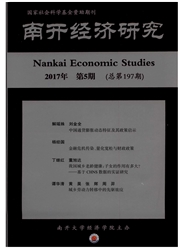

 中文摘要:
中文摘要:
本文研究了城乡收入差距扩大对中国居民消费需求的影响。基于生命周期框架的理论研究表明,收入水平越高,居民平均消费倾向和边际消费倾向越低;收入差距越大,居民消费需求越低。文章使用1978--2008年我国28个省、市、自治区的面板数据对理论模型进行了实证检验。结果显示,收入水平提高10000元,居民平均消费倾向下降25.6%,边际消费倾向下降7%;城乡收入差距扩大1单位,居民消费率下降6.5个百分点。数值模拟结果表明,城乡收入差距扩大导致居民消费率在2000--2008年间下降了3.42个百分点,解释了这一期间居民消费率下降的30.8%。
 英文摘要:
英文摘要:
This paper studies the relationship between urban-rural inequality and household consumption demand in China. Based on the life cycle framework, our theoretic model reveals that, people with higher income level have lower average and marginal propensity to consume than those with lower income. The greater the income inequality is, the lower the consumption demand is. We use the provincial panel data from 1978 to 2008 to test the above theory. The empirical results show that, for an increase of 10, 000 yuan in income, the average propensity to consume will drop by 25.6%, and marginal propensity to consume will drop by 7%. A unit increase in urban-rural inequality will lead the consumption ratio to drop by 6.5 percentage points. The simulation results show that the widening urban-rural inequality has lead the consumption ratio to drop by 3.42 percentage points between 2000 and 2008, which can account for 30.8% of the consumption ratio decline during this period.
 同期刊论文项目
同期刊论文项目
 同项目期刊论文
同项目期刊论文
 期刊信息
期刊信息
